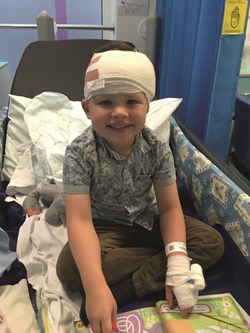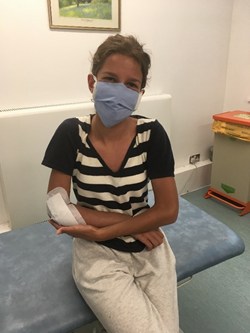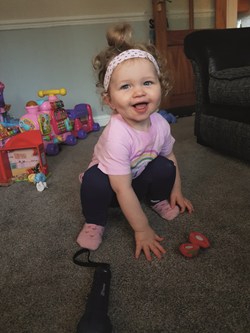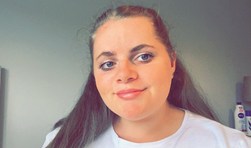How do I... prepare my child for surgery?
Taking your child to hospital for an operation is never easy. For deaf children, communication barriers can make surgery an even more disorientating experience. Here, two parents and two deaf young people share their top tips for preparing for surgery.

Sarah is mum to Alfie (5) who’s moderately to severely deaf on one side and uses a bone conduction hearing device.
Alfie was born with microtia and atresia of the left ear. He’s worn a bone conduction hearing device (BCHD) on a softband since he was 14 months old. When he was four, we decided to go for
BCHD implant surgery. It was booked for 19 March 2020, but cancelled the afternoon before due to COVID-19. We were devastated!
Six months later, the hospital phoned to say Alfie could come in for his surgery. I packed his bag with button-up pyjamas (so we didn’t have to pull his top over his head), Alfie’s favourite teddy, activities and lots of snacks. We also brought chocolates for the theatre team.
Alfie was excited, which helped. I went with him into the anaesthetic room, where they put cream on his hand so he didn’t feel the cannula going in. When he came out he was drowsy, but it wasn’t long before he was eating the snacks I’d brought. The operation went well and he went home the same day!
Alfie healed quickly and the BCHD was switched on two months later. He’s getting on so well! During the first week of him wearing it, we walked past a hedge full of sparrows and he said, “Mummy, the birds are so loud!” It was definitely the right decision. We’re so proud of him!

Ida (16) is moderately deaf and wears hearing aids.
In 2020 I broke my elbow and had an operation to fix it. As the operation was done during the COVID-19 pandemic, the hospital staff wore face masks, which made it difficult to hear. I explained I was deaf. The consultant spoke clearly and used the arm of a model skeleton to explain the surgery visually.
It was my first operation so I was nervous. Mum came down to theatre with me, which helped. There were several doctors talking to us wearing PPE, but as I was worried and it was busy, it was hard to hear. I gave my hearing aids to Mum to look after.
When I woke up, I felt disorientated and confused – a combination of no hearing aids and the anaesthetic! Once I realised what had happened, I felt calmer. Afterwards, I didn’t wear my hearing aids for a few days and just slept.
My advice to other deaf young people is to tell your nurse and doctor that you’re deaf and your communication needs. Even though they’ll have your medical history, it helps if you remind them. After the operation, you may find that removing your hearing technology helps you relax. Alternatively, you may prefer to keep your technology in if you want to feel more involved. Do what feels right for you and make the most of having your family waiting on you!

Nic is dad to Phoebe (2) who’s profoundly deaf and wears cochlear implants.
When Phoebe was diagnosed as deaf at one month old, we felt cochlear implants were the best option.
Unfortunately, her surgery was put on hold due to lockdown. Our family had to shield for two weeks beforehand and Phoebe was only allowed one parent with her.
With so much attention on Phoebe, we didn’t want her big sister, Evie-May, to feel left out. We explained what was happening and that she’d stay at Nanny and Granddad’s.
We knew Phoebe was in capable hands, but sending your child for
a major operation is hard. I felt especially anxious because I couldn’t be there myself. But after surgery, Phoebe recovered quickly. Within a couple of hours she was running around the ward
and pulled her bandages off twice!
In hindsight, I wish we’d spoken to other families in our position. Although we had support from our families and the hospital team, having appointments online meant we missed those incidental conversations you might have in person. Our anxiety about the pandemic overshadowed everything. My advice would be to actively seek out other parents. There might be questions you haven’t thought to ask.

Rebecca (21) is profoundly deaf and wears cochlear implants.
I’ve worn hearing aids since I was five, but as I got older, my hearing deteriorated. When I was 17, my consultant suggested getting a cochlear implant referral. It was one of the hardest decisions, but I knew I was likely to lose my remaining hearing and hearing aids would no longer help me.
I had the surgery when I was 19. Afterwards, I felt groggy, sick and my balance was affected. Waking up in a world of silence was strange, but I felt relieved the operation had gone well! Although I spent most of my hospital stay asleep, when I needed to communicate with hospital staff I used lip-reading and gestures. My family came to visit in the afternoon and helped with communication. I went home the next day.
For the next five weeks, I couldn’t hear at all. During this time I
communicated by lip-reading or text. Having my implants switched on was the best moment! I was so excited to explore new sounds.
I had the operation the September after I left school and started a modern apprenticeship a few days after my implants were switched on. We learned a lot in a short time. I’m not sure I would have coped without the implants.
Cochlear implants aren’t for everyone, but they’ve changed my life.
